北师大版高一英语必修二U4知识点
- 格式:doc
- 大小:36.00 KB
- 文档页数:7

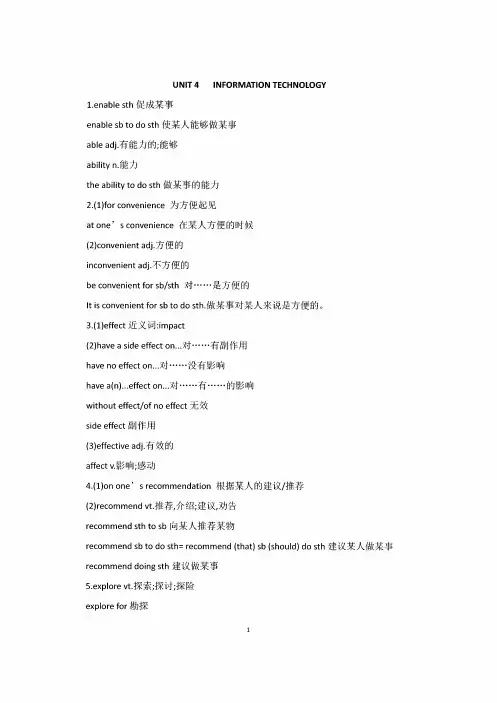
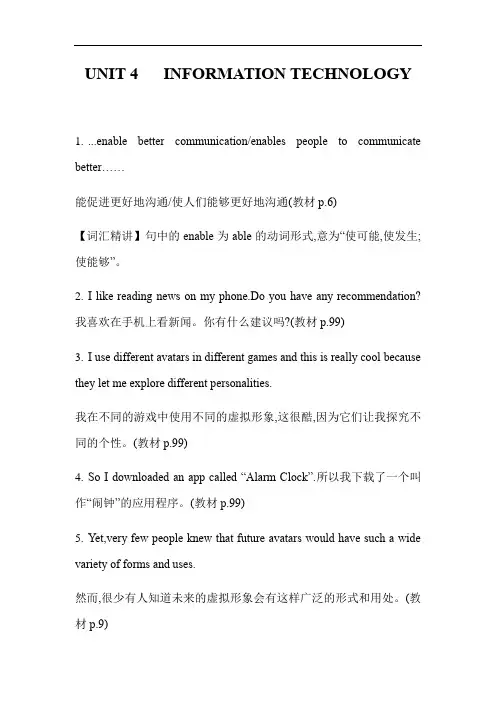
UNIT 4 INFORMATION TECHNOLOGY1....enable better communication/enables people to communicate better……能促进更好地沟通/使人们能够更好地沟通(教材p.6)【词汇精讲】句中的enable为able的动词形式,意为“使可能,使发生;使能够”。
2.I like reading news on my phone.Do you have any recommendation?我喜欢在手机上看新闻。
你有什么建议吗?(教材p.99)3.I use different avatars in different games and this is really cool because they let me explore different personalities.我在不同的游戏中使用不同的虚拟形象,这很酷,因为它们让我探究不同的个性。
(教材p.99)4.So I downloaded an app called “Alarm Clock”.所以我下载了一个叫作“闹钟”的应用程序。
(教材p.99)5.Yet,very few people knew that future avatars would have such a wide variety of forms and uses.然而,很少有人知道未来的虚拟形象会有这样广泛的形式和用处。
(教材p.9)6.In most web chats,people choose an avatar from a selection of ready-made images,or create their own images.在大多数网络聊天中,人们从现成的形象中选择一个虚拟形象或者创造自己的形象。
(教材p.9)7.The use of avatars has also caused a few concerns.虚拟形象的使用也引起了一些担忧。
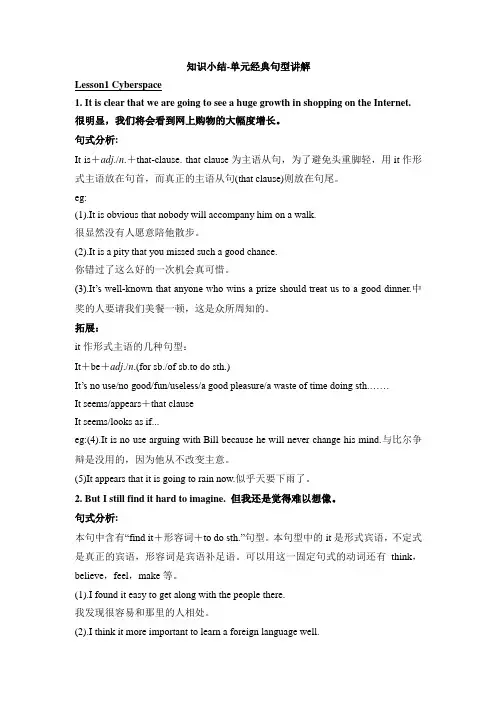
知识小结-单元经典句型讲解Lesson1 Cyberspace1. It is clear that we are going to see a huge growth in shopping on the Internet. 很明显,我们将会看到网上购物的大幅度增长。
句式分析:It is+adj./n.+that-clause. that clause为主语从句,为了避免头重脚轻,用it作形式主语放在句首,而真正的主语从句(that clause)则放在句尾。
eg:(1).It is obvious that nobody will accompany him on a walk.很显然没有人愿意陪他散步。
(2).It is a pity that you missed such a good chance.你错过了这么好的一次机会真可惜。
(3).It’s wellknown that anyone who wins a prize should treat us to a good dinner.中奖的人要请我们美餐一顿,这是众所周知的。
拓展:it作形式主语的几种句型:It+be+adj./n.(for sb./of sb.to do sth.)It’s no use/no good/fun/useless/a good pleasure/a waste of time doing sth.……It seems/appears+that clauseIt seems/looks as if...eg:(4).It is no use arguing with Bill because he will never change his mind.与比尔争辩是没用的,因为他从不改变主意。
(5)It appears that it is going to rain now.似乎天要下雨了。
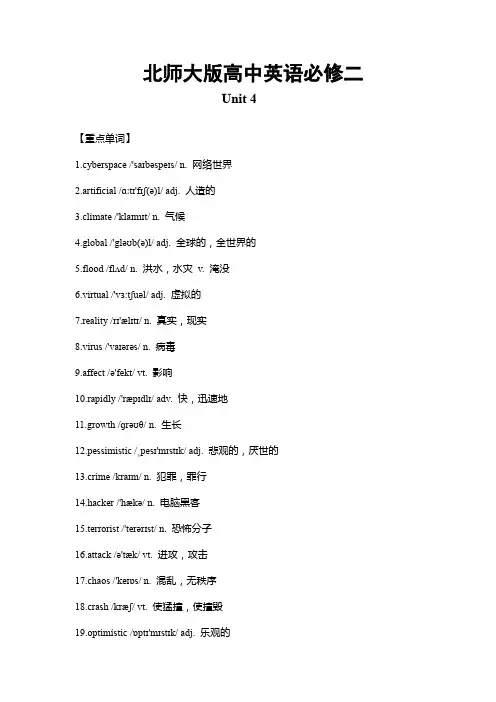
北师大版高中英语必修二Unit 4【重点单词】1.cyberspace /'saɪbəspeɪs/ n. 网络世界2.artificial /ɑːtɪ'fɪʃ(ə)l/ adj. 人造的3.climate /'klaɪmɪt/ n. 气候4.global /'gləʊb(ə)l/ adj. 全球的,全世界的5.flood /flʌd/ n. 洪水,水灾v. 淹没6.virtual /'vɜ:tʃuəl/ adj. 虚拟的7.reality /rɪ'ælɪtɪ/ n. 真实,现实8.virus /'vaɪərəs/ n. 病毒9.affect /ə'fekt/ vt. 影响10.rapidly /'ræpɪdlɪ/ adv. 快,迅速地11.growth /ɡrəʊθ/ n. 生长12.pessimistic /ˌpesɪ'mɪstɪk/ adj. 悲观的,厌世的13.crime /kraɪm/ n. 犯罪,罪行14.hacker /'hækə/ n. 电脑黑客15.terrorist /'terərɪst/ n. 恐怖分子16.attack /ə'tæk/ vt. 进攻,攻击17.chaos /'keɪɒs/ n. 混乱,无秩序18.crash /kræʃ/ vt. 使猛撞,使撞毁19.optimistic /ɒptɪ'mɪstɪk/ adj. 乐观的20.entertainment /entə'teɪnmənt/ n. 娱乐,款待21.disappear /dɪsə'pɪə/ vi. 消失22.harm /hɑːm/ vt. & n. 伤害,损害23.obvious /'ɒbvɪəs/ adj. 明显的,显而易见的24.destruction /dɪ'strʌkʃ(ə)n/ n. 破坏,毁灭itary /'mɪlɪt(ə)rɪ/ adj. 军用的,军事的26.scientific /saɪən'tɪfɪk/ adj. 科学的27.nuclear /'njuːklɪə/ adj. 原子能的work /'netwɜːk/ n. 网络29.project /'prɒdʒekt/ n. 计划,方案;工程30.fashion /'fæʃ(ə)n/ n. 时髦,时尚31.fancy /'fænsɪ/ v. 想要做,幻想32.suggestion /sə'dʒestʃ(ə)n/ n. 建议,提议33.reject /rɪ'dʒekt/ vt. 拒绝,不接受34.arrangement /ə'reɪndʒmənt/ n. 安排35.title /'taɪt(ə)l/ n. 标题,题目36.destination /destɪ'neɪʃ(ə)n/ n. 目的地37.flesh /fleʃ/ n. 肉,肉体38.exit /'eksɪt/ vi. 出,离开39.historical /hɪ'stɒrɪk(ə)l/ adj. 历史的,有关历史的40.site /saɪt/ n. 位置,场所41.pack /pæk/ v. 收拾(行李),打包42.dip /dɪp/ v. 浸43.toe /təʊ/ n. 脚趾lionaire /mɪljə'neə/ n. 百万富翁45.smoker /'sməʊkə/ n. 吸烟者46.non-smoker /nɒn'sməʊkə/ n. 非吸烟者47.tourism /'tʊərɪz(ə)m/ n. 观光,游览48.guide /ɡaɪd/ n. 导游,向导;指南49.locate /lə(ʊ)'keɪt/ v. 使……坐落于,位于50.seaside /'siːsaɪd/ n. 海滨,海边51.settle /set(ə)l/ v. 定居52.settlement /'setəlmənt/ n. (新)定居地53.central /'sentr(ə)l/ adj. 中央的,中心的54.suburb /'sʌbɜːb/ n. 市郊,郊区55.zone /zəʊn/ n. 地域,地区56.volcano /vɒl'keɪnə/ n. 火山57.harbour /'hɑ:bə/ n. 海港58.view /vjuː/ n. 景色,风景59.sunshine /'sʌnʃaɪn/ n. 阳光60.average /'ævərɪdʒ/ adj. 平均的61.surfing /'sɜːfɪŋ/ n. 冲浪62.regular /'reɡjʊlə/ adj. 定期的,规则的63.location /lə(ʊ)'keɪʃ(ə)n/ n. 位置,场所64.steel /stiːl/ n. 钢,钢铁65.material /mə'tɪərɪəl/ n. 材料,原料66.Chinatown /'tʃaɪnəˌtaʊn/ n. 唐人街67.officially /ə'fɪʃ(ə)lɪ/ adv. 正式地68.scenery /'siːnərɪ/ n. 风景,景色69.cuisine /kwɪ'ziːn/ n. 烹饪70.attractive /ə'træktɪv/ adj. 吸引人的71.spider /'spaɪdə/ n. 蜘蛛72.web /web/ n. 蜘蛛网,网状物【重点短语】e true 实现2.take measures 采取措施3.take steps 采取步骤4.hang on 别挂机5.be up to 做,从事,在于6.get into touch 取得联系7.fancy doing sth 想做某事8.in the flesh 本人;亲身9.be to do sth 将做某事10.make an arrangement 安排11.offer sb sth/offer sth to sb 提供某人某物12.settle down 定居下来13.on average 平均14.be optimistic about 对……乐观15.a large population 人口众多16.settle up 结账,清债17.call on sb 拜访某人18.be prepared for 为……做好准备19.be prepared to do sth 愿意做某事20.live on pension 靠退休金生活【重点句型】1.In 1983, there were only 200 computers connected to the Internet; now there are around 50million and this growth is clearly going to continue.1983年,只有200台计算机联网,现在有大约5000万台,并且这种增长显然会持续下去。
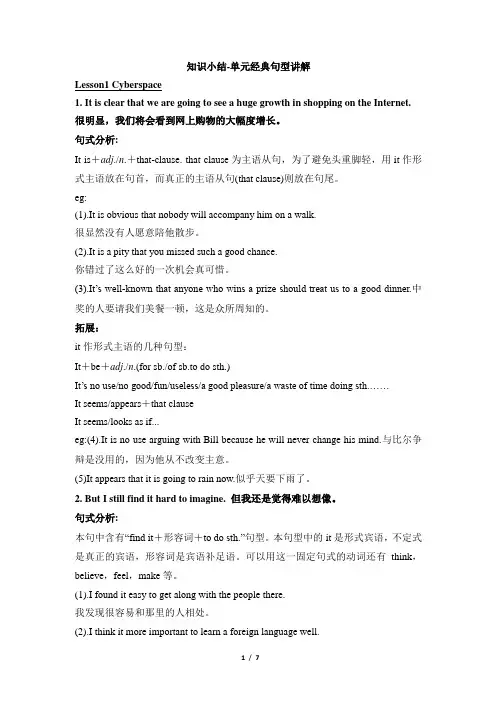
知识小结-单元经典句型讲解Lesson1 Cyberspace1. It is clear that we are going to see a huge growth in shopping on the Internet. 很明显,我们将会看到网上购物的大幅度增长。
句式分析:It is+adj./n.+that-clause. that clause为主语从句,为了避免头重脚轻,用it作形式主语放在句首,而真正的主语从句(that clause)则放在句尾。
eg:(1).It is obvious that nobody will accompany him on a walk.很显然没有人愿意陪他散步。
(2).It is a pity that you missed such a good chance.你错过了这么好的一次机会真可惜。
(3).It’s wellknown that anyone who wins a prize should treat us to a good dinner.中奖的人要请我们美餐一顿,这是众所周知的。
拓展:it作形式主语的几种句型:It+be+adj./n.(for sb./of sb.to do sth.)It’s no use/no good/fun/useless/a good pleasure/a waste of time doing sth.……It seems/appears+that clauseIt seems/looks as if...eg:(4).It is no use arguing with Bill because he will never change his mind.与比尔争辩是没用的,因为他从不改变主意。
(5)It appears that it is going to rain now.似乎天要下雨了。

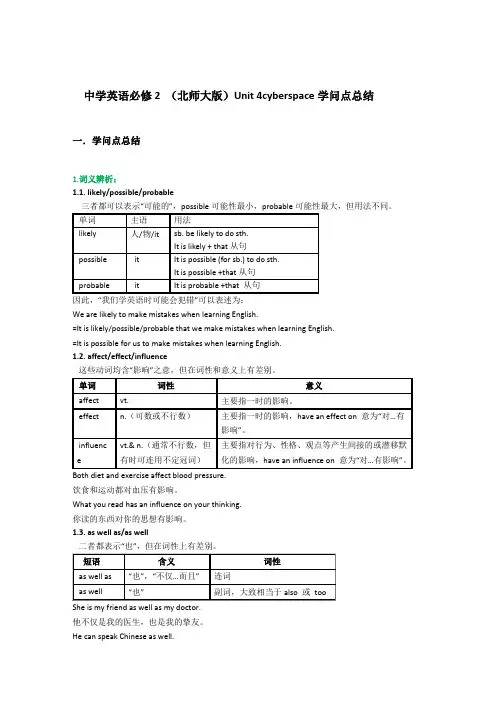
中学英语必修2 (北师大版)Unit 4cyberspace学问点总结一.学问点总结1.词义辨析:1.1. likely/possible/probable三者都可以表示“可能的”,possible可能性最小,probable可能性最大,但用法不同。
因此,“我们学英语时可能会犯错”可以表述为:We are likely to make mistakes when learning English.=It is likely/possible/probable that we make mistakes when learning English.=It is possible for us to make mistakes when learning English.1.2. affect/effect/influence这些动词均含“影响”之意,但在词性和意义上有差别。
Both diet and exercise affect blood pressure.饮食和运动都对血压有影响。
What you read has an influence on your thinking.你读的东西对你的思想有影响。
1.3. as well as/as well二者都表示“也”,但在词性上有差别。
She is my friend as well as my doctor.他不仅是我的医生,也是我的挚友。
He can speak Chinese as well.他也会说中文。
1.4. be known for/be known as/be known toGeorge is known as a successful banker.乔治作为胜利的银行家而出名。
Guilin is known for its beautiful scenery.桂林因风景美丽而著名。
She is known to everyone in the college.他在学院里人人皆知。

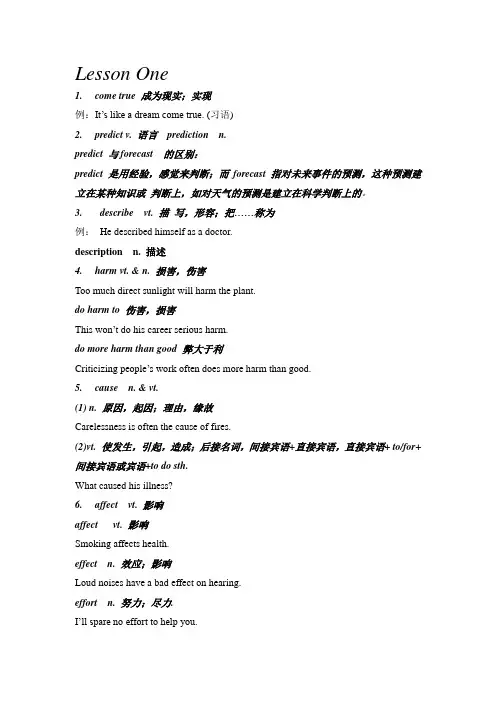
Lesson Onee true 成为现实;实现例:It’s like a dream come true. (习语)2.predict v. 语言prediction n.predict 与forecast 的区别:predict 是用经验,感觉来判断;而forecast指对未来事件的预测,这种预测建立在某种知识或判断上,如对天气的预测是建立在科学判断上的。
3.describe vt. 描写,形容;把……称为例:He described himself as a doctor.description n. 描述4.harm vt. & n. 损害,伤害Too much direct sunlight will harm the plant.do harm to 伤害,损害This won’t do his career serious harm.do more harm than good 弊大于利Criticizing people’s work often does more harm than good.5.cause n. & vt.(1) n. 原因,起因;理由,缘故Carelessness is often the cause of fires.(2)vt. 使发生,引起,造成;后接名词,间接宾语+直接宾语,直接宾语+ to/for+间接宾语或宾语+to do sth.What caused his illness?6.affect vt. 影响affect vt. 影响Smoking affects health.effect n. 效应;影响Loud noises have a bad effect on hearing.effort n. 努力;尽力.I’ll spare no effort to help you.affect vt. 使感染;假装Her heart and kidneys had become affected.7.offer vt. 提供,供应;出价;主动提出n. 主动提议;出价;特价(1)vt. offer sb. sth. = offer sth. to sb. 向某人提供某物I offered him a glass of wine. = I offered a glass of wine to him.(2)offer sb. some money for sth. 出价多少钱向某人买某物He offered $4,000 for the car.(3)offer to do sth. 主动做某事(4)n. I’ve had an offer of $4,000 for the small house.(5)on offer 削价出售8.voice 用作及物动词,意思是“表达,吐露”;voice还可用作名词,意思是“声音,嗓音”或“意见;发言权”常用短语:voice one’s deep love to sb. 表达对某人深深地爱voice one’s opinion 表达某人的观点with one voice 异口同声in a loud/quiet voice 大声地/轻声低9.采取行动:take actiontake a step/stepstake a measure/measures10.fear v. 后接名词,不定式,v-ing形式或从句He fears death. = He fears to die. = He fears dying.fear n. “害怕,恐惧,担心”(1)for fear of + sth./ doing sth. / for fear (that)……生怕……,以免……(2)in fear of 害怕(3)with fear 由于害怕They hurried away for fear of being caught in the rain. = They hurried away for fear that they should be caught in the rain.11.复杂疑问句构成:疑问词+do you think/suppose/imagine/believe/expect…+其余部分(其余部分语序为陈述句语序)What do you think technology will change our lives?12.do (看见动作全过程)see sb. doing (看到动作正在进行)done (看到某事被做,表示完成或状态)13.will, be going to, be about to与be to do 的用法异同(1)表“推测”用法时,用will表示推测是从我们的直觉,知识及经验出发的;用be going to 表示推测是来自证据或事实。

UNIT 4 INFORMATION TECHNOLOGY1....enable better communication/enables people to communicate better……能促进更好地沟通/使人们能够更好地沟通(教材p.6)【词汇精讲】句中的enable为able的动词形式,意为“使可能,使发生;使能够”。
2.I like reading news on my phone.Do you have any recommendation?我喜欢在手机上看新闻。
你有什么建议吗?(教材p.99)3.I use different avatars in different games and this is really cool because they let me explore different personalities.我在不同的游戏中使用不同的虚拟形象,这很酷,因为它们让我探究不同的个性。
(教材p.99)4.So I downloaded an app called “Alarm Clock”.所以我下载了一个叫作“闹钟”的应用程序。
(教材p.99)5.Yet,very few people knew that future avatars would have such a wide variety of forms and uses.然而,很少有人知道未来的虚拟形象会有这样广泛的形式和用处。
(教材p.9)6.In most web chats,people choose an avatar from a selection of ready-made images,or create their own images.在大多数网络聊天中,人们从现成的形象中选择一个虚拟形象或者创造自己的形象。
(教材p.9)7.The use of avatars has also caused a few concerns.虚拟形象的使用也引起了一些担忧。
名师讲堂:Unit4 重点单词精讲重点单词▲【词条1】settle【课文原句】The history of the city goes back 650 years when the Maoris settled in the area. (Page 14)【名师点拨】1. settle vi. 意思是"安家;定居"(指在经过漂泊之后在某地安家)。
例如:After years of travel, we decided to settle here.2. settle vt. 意思为"安家,定居;安放;安顿",多指经过漂泊或奔忙之后使自己或某人在某处安顿下来,或把移动不定的东西认真地安放在某处。
例如:He settled his family at the foot of the mountain.【知识拓展】settle down 的用法:1) 安稳地坐下来。
例如:He settled down in an armchair to read his new book.2) 定居下来。
例如:They have settled down happily in their new house.3) 平静下来;镇定下来。
例如:When the children settled down, he continued to tell the story.4) 开始安心做事。
例如:Let’s settle down to our work.▲【词条2】protest【课文原句】In 1985, ... and since then Auckland has been a center for protest against nuclear testing in Asia Pacific. (Page 14)【名师点拨】protest n. 意思是"反对;抗议"。
Lesson4 精讲点拨一、精讲点拨1.It has a population of just under a million people and is located on North Island奥克兰人口不足100万,位于北岛(1)population n.人口,人口数归纳拓展①Population作主语时,谓语动词用单数形式,但前面如果有百分之几或几分之几时,谓语动词用复数形式。
②population 作主语时,用what提问,不用how much或how many。
③population 表示某地有多少人口时,前面常常加冠词a或the;表示人口多或少时,用large或small。
④人口的指代要用that。
(2)locate vt.找出……的位置,探明;使……坐落于,在……位置The Bank of China is located in the center of the city.中国银行位于城市的中心归纳拓展locate的名词为location,意为“位置,场地”。
a good location for sth.建某物的好地方be located in位于be与动词的过去分词连用,表示状态。
类似的还有:be determined to do sth.下决心做某事;be lost in thought沉思;be married to sb.与某人结婚;be seated就坐典题印证Ideally for Broadway theatres and Fifth Avenue,the New York Park hotel is a favourite with many guests.A.locatingB.being locatedC.having been locatedD.located答案:D locate与the New York hotel 之间为逻辑上的动宾关系,故locate须用过去分词。
模块2 Unit4知识点总结1.find out 发现,查出,弄清楚2.all sorts of 各种各样的3. affect sb./ sth. 影响......3.have an effect on... 对......有影响4.under attack 遭到攻击5.offer to do sth. 主动提出做某事6.offer sb. sth. / offer sth. to sb. 向某人提供某物7.do harm to sb. 对某人有害8.be harmful to ... 对......有害9.make up 组成;编造;弥补;化妆e true 实现11.be pessimistic/optimistic about 对......悲观/ 乐观12.believe in 信任13.as if / though 好像,似乎14.be in fashion 正在流行15.be out of fashion 过时16.fancy doing sth. 想要做某事17.How/What about... ?......如何?18.reject doing sth. / refuse to do sth. 拒绝做......19.suggest doing... / suggest that ...(should) do ... 建议做......20.make arrangements for... 为......做安排21.get in touch with sb. 和某人取得联系22.lose touch with sb. 和某人失去联系23.keep in touch with sb 和某人保持联系24.hang on 别挂断(电话)25.be up to 做,从事于26.be up to sb. 由某人决定27.pay attention to 注意28.depend on 取决于,依靠29.go camping 去野营30.have problems with... 在......有问题31.What’s more 另外,再者说32.do with/ deal with 处理33.take part in 参加34.in the flesh 本人亲自35.imagine doing... 想象做......36.It/ That (all) depends. 看情况而定。
Lesson Onee true 成为现实;实现例:It’s like a dream come true. (习语)2.predict v. 语言prediction n.predict 与forecast 的区别:predict 是用经验,感觉来判断;而forecast指对未来事件的预测,这种预测建立在某种知识或判断上,如对天气的预测是建立在科学判断上的。
3.describe vt. 描写,形容;把……称为例:He described himself as a doctor.description n. 描述4.harm vt. & n. 损害,伤害Too much direct sunlight will harm the plant.do harm to 伤害,损害This won’t do his career serious harm.do more harm than good 弊大于利Criticizing people’s work often does more harm than good.5.cause n. & vt.(1) n. 原因,起因;理由,缘故Carelessness is often the cause of fires.(2)vt. 使发生,引起,造成;后接名词,间接宾语+直接宾语,直接宾语+ to/for+间接宾语或宾语+to do sth.What caused his illness?6.affect vt. 影响affect vt. 影响Smoking affects health.effect n. 效应;影响Loud noises have a bad effect on hearing.effort n. 努力;尽力.I’ll spare no effort to help you.affect vt. 使感染;假装Her heart and kidneys had become affected.7.offer vt. 提供,供应;出价;主动提出n. 主动提议;出价;特价(1)vt. offer sb. sth. = offer sth. to sb. 向某人提供某物I offered him a glass of wine. = I offered a glass of wine to him.(2)offer sb. some money for sth. 出价多少钱向某人买某物He offered $4,000 for the car.(3)offer to do sth. 主动做某事(4)n. I’ve had an offer of $4,000 for the small house.(5)on offer 削价出售8.voice 用作及物动词,意思是“表达,吐露”;voice还可用作名词,意思是“声音,嗓音”或“意见;发言权”常用短语:voice one’s deep love to sb. 表达对某人深深地爱voice one’s opinion 表达某人的观点with one voice 异口同声in a loud/quiet voice 大声地/轻声低9.采取行动:take actiontake a step/stepstake a measure/measures10.fear v. 后接名词,不定式,v-ing形式或从句He fears death. = He fears to die. = He fears dying.fear n. “害怕,恐惧,担心”(1)for fear of + sth./ doing sth. / for fear (that)……生怕……,以免……(2)in fear of 害怕(3)with fear 由于害怕They hurried away for fear of being caught in the rain. = They hurried away for fear that they should be caught in the rain.11.复杂疑问句构成:疑问词+do you think/suppose/imagine/believe/expect…+其余部分(其余部分语序为陈述句语序)What do you think technology will change our lives?12.do (看见动作全过程)see sb. doing (看到动作正在进行)done (看到某事被做,表示完成或状态)13.will, be going to, be about to与be to do 的用法异同(1)表“推测”用法时,用will表示推测是从我们的直觉,知识及经验出发的;用be going to 表示推测是来自证据或事实。
Look at those black clouds. It’s going to rain.I think people will be able to have holidays on Mars in 100 years’ time.(2)表示“将来打算”用法时:a.be going to 表示事先经过考虑的打算(will 表示临时想到的)We are going to Britain next month.b.be going to 表示“预见”,即现在已有迹象表明要发生或即将发生的某种情况;Good heavens, I must hurry. I am going to be late.c.be going to 表示“意图”,即打算在将来做某事。
I’m going to help my parents run our business.(3)be about to do 表示快要做某事,指的是一个眼下就要发生的动作,因此不能与确切的时间状语连用。
但是,它可以和as 或when引导的时间状语从句连用。
The plane is about to take off.(4) a. be to do 相当于should do,即“某事应当或必须如何做”,常用在通知或注意事项里。
These tables are to be kept out of the reach of children.b. be to do 可以用于表示命令,常用语父母让子女做某事或上级指示下级去做某事。
You are to finish your homework before you watch TV.c. be to do 也可以用于表示预先安排的计划或约定。
I’m to meet Mr. Brown at ten in the evening14.将来进行时构成:助动词shall/will +be +现在分词---将来某一时刻或某一段时间正在进行的动作。
Lesson Two Websites1.fancy v. 想象,设想;认为;喜欢;爱好fancy doing sth.n. 想要;爱好2.hang on 抓紧;坚持;别挂电话3.be up toHe is working up to now.What are you up to now?He is well up to this work.It’s up to me to help them with maths.4.suggest doing sth.suggest sb. should do sth.5.keep in touch (with) ……get in touch (with)lose touch (with)be in touch (with)be/get out of touch (with)bring …into/in touch (with)6.make, find, believe, think, consider与feel + it (形式宾语) +adj. to do sth.7.have sth. done(1)表示主语有意识的行为,have具有使役意义,主语不参加。
(2)表示“遭遇”“经历”,此时句子所表示的动作是违背主语的意志的。
8.虚拟语气与真实语气相反,它表示说话人的愿望,假设,猜测或建议,而不表示客观存在的事实。
(1)与现在事实相反的假设句型:if +主语+动词的过去式(be动词用were)+其他,主语+should/would/could/might+动词原形+其他(2)与过去事实相反的假设:句型:if+主语+had+动词的过去分词+其他,主语+should/would/could/might+have+动词的过去分词+其他(3)与将来事实相反的假设:句型:a. if+主语+动词的过去式+其他b. if+主语+were to +动词原形+其他c.if+主语+should + 动词原形+其他,主语+should/would/could/might+动词原形+其他虚拟语气用于表示要求,建议,命令等从句中,从句谓语动词的形式为:should +动词原形(should可省去)。
(1)宾语从句中常见的动词有:suggest, advise, propose, insist,urge,ask,demand,request,desire,order,command,require,recommend,prefer等。
(2)主语从句中常见的形容词有:necessary, desirable,preferable,advisable,important,natural,urgent,strange等;常见的过去分词有:demanded, ordered, proposed,required, suggested等,即宾语从句中的动词;常见的名词有:an idea, a shame, a pity, no wonder 等。
(3)用于表语从句或同位语从句中常见的名词有:advice, demand, order, proposal, suggestion, request, idea等。
(4)虚拟语气用于wish 之后的宾语从句中,常译为“但愿……”“……就好了”。
a.that 从句谓语动词:动词的过去式(be 动词一般用were)b.表示过去未能实现的愿望。
that 从句谓语动词:had +过去分词c.表示有可能实现的愿望。
that 从句谓语动词:would/might +动词原形d.在It is wished that …结构以及wish 用作名词所引导的表语从句和同位语从句中也要用虚拟语气,基本用法同上。
(5)虚拟语气用于would rather/prefer之后的从句中,表示希望或委婉地责备。